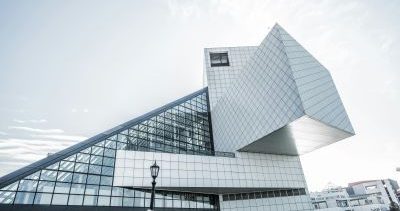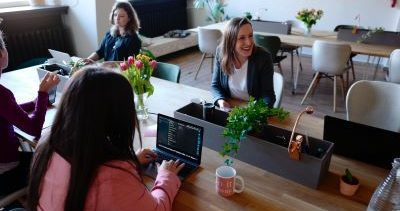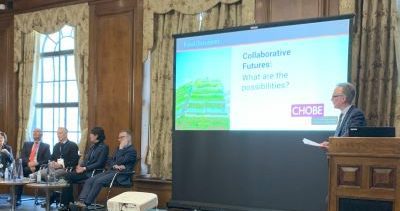UCEM presents top 2022 Property Awards prize to the leader of The Crown Estate
Posted on: 17 October, 2022
Sustainability, innovation and equality were the themes recognised at UCEM’s 35th Property Awards on Thursday 13 October 2022.
Held at the Institute of Directors in London, the event saw the prestigious ‘Property Award’ presented to Dan Labbad, Chief Executive of The Crown Estate in recognition of his outstanding contribution to the property industry.
Before presenting his award, Amanda Clack, Executive Director CBRE and UCEM Chair of the Board of Trustees shared how Dan has been an active and passionate advocate for sustainability from early on in his career and is widely recognised for being a champion of change with his work around diversity, equity and inclusion. Amanda also expressed how Dan aims to use his role at The Crown Estate to give back.
In his speech, Dan reflected on where his passion comes from and what his key drivers are. He also spoke of the UCEM’s work, saying, “I want to recognise the wonderful work UCEM is doing to educate the young people of this country because ultimately it’s them that will help shape – and save – our collective future.’’
Commenting on his award Dan said, “It’s a huge honour to be recognised for playing a small part in creating a more sustainable and inclusive property industry. I’d like to thank UCEM for the award and all of those who have contributed to these efforts along the way. However, I am also humbled and concerned by the collective challenge we still have ahead in tackling these important issues. We must all continue to play our part, drawing on diverse views to ensure we deliver lasting and sustainable change.”
Dan was amongst 100 invited guests and nominees to celebrate the work of UCEM students, alumni and research projects within the built environment.
Earlier in the proceedings, Nisha Chavda, a MSc Construction Management graduate from 2020, was announced as the winner of the Alumni Award. Now a Senior Project Manager at Pick Everard, Nisha was commended for her work as a role model and mentor to new entrants to the world of work, building from her personal experiences as an Asian woman joining the industry.
Remarking on her accomplishment, Nisha reflected on how being nominated gave her the jolt she needed to sit down and reflect on her achievements saying, “Being a perpetual believer in never having done enough, one can become weary but this much needed pause was refreshing. I’m glad the work I’m doing is making an impact somehow, and I’m grateful that part of the journey so far has been with UCEM.”
Peter Maxwell, Director of Design at London Legacy Development Corporation who was awarded a distinction for his MBA, picked up the UCEM Academic Excellence Award, stating he was really humbled to be awarded and that it was amazing to be in amongst such a strong field of other applicants.
Since 2018, UCEM has a prize for a proposed research project, the Harold Samuel Research Prize, with a funding sum of £14,600. This year it was presented to Professor Obas John Ebohon, London South Bank University. This project will explore how to utilise construction and demolition waste for the digital production of cementitious blocks. Relevant to the built environment and wider sustainability issues it will address the landfill and carbon agenda, to demonstrate a practical and viable solution.
Principal Ashley Wheaton said, “It was evident from the speeches, awards and conversations, that this year’s event was a significant milestone in the University’s 103-year history, providing an inspirational and relevant launchpad for UCEM’s drive to be the most sustainable university in the world. I am extremely proud of our accomplishments during the last year and everything that is to come as we continue our journey to become the centre of excellence for Built Environment Education.”
Read Dan’s Property Awards speech
Thank you to UCEM and the Board of Trustees for awarding me this honour. I am truly humbled to be recognised for areas particularly close to my heart: sustainability; and diversity, equity and inclusion.
I’ve been asked to reflect upon where this passion comes from and what my key drivers are. The first thing I want to highlight is that I am far from perfect. Like the rest of you, I am simply trying to do my best to make a difference, acknowledging that there is so much work still to be done.
I grew up in Sydney. My father was an immigrant from Egypt and came to Australia when he was about 20 years old. In my youth, I watched him not realise his potential because of systems bias and the animosity towards him due to where he came from and the difference he represented.
While I had the privilege to never suffer such bias, this fuelled a huge passion and a great sense of social justice that centred around a belief that we should all have an equal opportunity to reach our potential.
This background and the passion it has instilled in me have driven my career and the things that I have pushed. At their core, diversity and sustainability are all about ensuring that people today and into the future have this opportunity to reach their potential. In my mind that’s what we are striving for.
Even though I gratefully accept this huge honour, it is essential to acknowledge that we’ve still got a long way to go to give our children a future in which their quality of life is not diminished. If we don’t act fast and work together, that future is in jeopardy.
What I’m scared of more than anything else is that at the end of my career I will look back feeling that I have not done enough. That thought both concerns me and drives me. And as I’ve progressed through my career, it has been more important than ever to make sure I come back to these values.
All of us can make a difference – large or small – through our careers and our lives to create better outcomes for people. Whether that is through the way we use our positions of leadership; or the way we hold our employers to account; or the way our pensions are invested; or the way we talk to our children about how they can ensure that future – we have to use every opportunity we have to influence.
I want to recognise the wonderful work UCEM is doing to educate the young people of this country because ultimately it’s them that will help shape – and save – our collective future.
And finally, more than anything else, I want to leave you with this. Young people often ask me, ‘How do you become a Chief Executive?’. My answer is always the same, ‘No doubt you need to be technically, strategically and commercially credible at what you do, but what’s equally important for is to learn how to transcend difference. To see and harness the beauty in difference.’ Today, I believe that is what leadership is all about.
Thank you very much.






